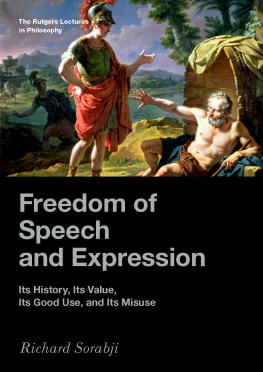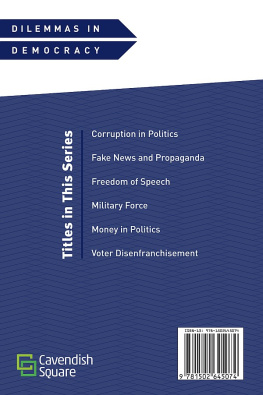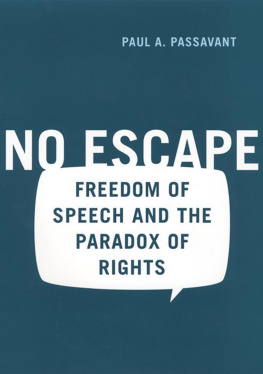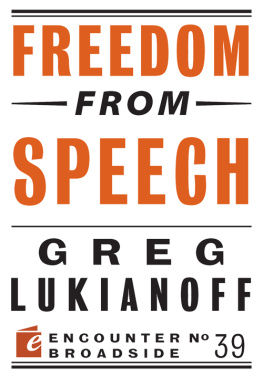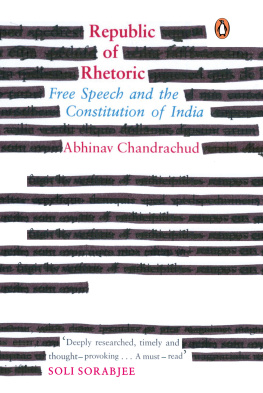Richard Sorabji - Freedom of Speech and Expression
Here you can read online Richard Sorabji - Freedom of Speech and Expression full text of the book (entire story) in english for free. Download pdf and epub, get meaning, cover and reviews about this ebook. year: 2021, publisher: Oxford University Press, genre: Politics. Description of the work, (preface) as well as reviews are available. Best literature library LitArk.com created for fans of good reading and offers a wide selection of genres:
Romance novel
Science fiction
Adventure
Detective
Science
History
Home and family
Prose
Art
Politics
Computer
Non-fiction
Religion
Business
Children
Humor
Choose a favorite category and find really read worthwhile books. Enjoy immersion in the world of imagination, feel the emotions of the characters or learn something new for yourself, make an fascinating discovery.
- Book:Freedom of Speech and Expression
- Author:
- Publisher:Oxford University Press
- Genre:
- Year:2021
- Rating:4 / 5
- Favourites:Add to favourites
- Your mark:
- 80
- 1
- 2
- 3
- 4
- 5
Freedom of Speech and Expression: summary, description and annotation
We offer to read an annotation, description, summary or preface (depends on what the author of the book "Freedom of Speech and Expression" wrote himself). If you haven't found the necessary information about the book — write in the comments, we will try to find it.
Freedom of Speech and Expression — read online for free the complete book (whole text) full work
Below is the text of the book, divided by pages. System saving the place of the last page read, allows you to conveniently read the book "Freedom of Speech and Expression" online for free, without having to search again every time where you left off. Put a bookmark, and you can go to the page where you finished reading at any time.
Font size:
Interval:
Bookmark:

Larry Temkin, series editor

Published in the series
Vagueness: A Global Approach
Kit Fine

Oxford University Press is a department of the University of Oxford. It furthers the Universitys objective of excellence in research, scholarship, and education by publishing worldwide. Oxford is a registered trade mark of Oxford University Press in the UK and certain other countries.
Published in the United States of America by Oxford University Press
198 Madison Avenue, New York, NY 10016, United States of America.
Oxford University Press 2021
All rights reserved. No part of this publication may be reproduced, stored in a retrieval system, or transmitted, in any form or by any means, without the prior permission in writing of Oxford University Press, or as expressly permitted by law, by license, or under terms agreed with the appropriate reproduction rights organization. Inquiries concerning reproduction outside the scope of the above should be sent to the Rights Department, Oxford University Press, at the address above.
You must not circulate this work in any other form and you must impose this same condition on any acquirer.
Library of Congress Cataloging-in-Publication Data
Names: Sorabji, Richard, author.
Title: Freedom of speech and expression : its history, its value, its good use, and its
misuse / Richard Sorabji.
Description: New York, NY : Oxford University Press, 2021. |
Includes bibliographical references and index.
Identifiers: LCCN 2020037508 (print) | LCCN 2020037509 (ebook) |
ISBN 9780197532157 (hardback) | ISBN 9780197532171 (epub)
Subjects: LCSH: Freedom of speech. | Freedom of expression. | Social media.
Classification: LCC JC591.S66 2021 (print) | LCC JC591 (ebook) |
DDC 323.44/3dc23
LC record available at https://lccn.loc.gov/2020037508
LC ebook record available at https://lccn.loc.gov/2020037509
DOI: 10.1093/oso/9780197532157.001.0001
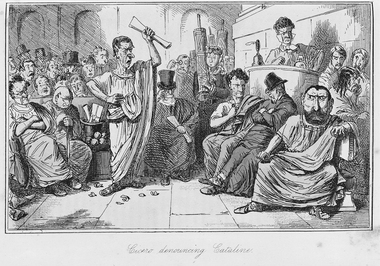
Cicero denouncing Catiline by John Leech. Courtesy of the Posner Memorial Collection, Special Collections, Carnegie Mellon University Libraries, Pittsburgh PA. From Gilbert Abbott A. Beckett and John Leech, The Comic History of Rome. London 1870: Bradbury, Evans & Co. (DG210 A12 1852A).
To Laila and Nadia
In 2014, I had the distinct privilege of being Chair of the Department of Philosophy at Rutgers, The State University of New Jersey. Soon after I become Chair, Peter Ohlin, philosophy editor of Oxford University Press, USA, broached the idea of Rutgers organizing a major annual lecture series, where Rutgers would carefully select among the worlds leading philosophers to give a series of three original lectures which would be subsequently revised for publication in a book series by Oxford University Press. It was Peters hope that such a series might soon come to be recognized as one of the most important annual events on the philosophical calendar, and might one day come to rival the Locke Lectures, Dewey Lectures, and Tanner Lectures in stature.
I shared Peters enthusiasm for the idea, and promised to take it up with my colleagues and our administration. Unsurprisingly, the response was overwhelmingly supportive. However, it was decided that if we were going to take on such a commitment, we wanted the endeavour to involve much more than just adding another three lectures, each year, to our already crowded academic calendar. We wanted to create a lecture series that was truly distinctive and special; one that would benefit not only our faculty, but our outstanding graduate students, undergraduates, and the wider Rutgers community. Moreover, we were especially concerned to create a lecture series that would be both personally and intellectually rewarding for our visiting speakers.
After much discussion, the Rutgers Lectures in Philosophy took shape. First, the Department was committed to bringing in genuinely world-class philosophers who had already done, and were continuing to do, seminal work that was profoundly impacting their areas of research and, in some cases, the world at large. Our hope, and expectation, was that the lectures they would be delivering at Rutgers, and the books based on those lectures, would help set the philosophical agendas in their respective fields for many years to come. Bearing that goal foremost in mind, we were also committed to inviting a diverse group of speakers, representing a broad spectrum of philosophical areas and interests within the analytic tradition.
Second, speakers would be asked to be available on campus for a full week, and to pitch their first lecture so that interested alumni, the broader Rutgers academic community, and the general public might benefit from these internationally renowned philosophers. Their two subsequent lectures would be aimed at the high philosophical level that would most benefit the Philosophy faculty, graduate students, visitors, and speaker, and would likely form the backbone of the speakers subsequent book. Each lecture would be followed by discussion, a reception, and dinner, to facilitate serious engagement with the speakers views.
Third, speakers would distribute drafts of their lectures, which would be read and discussed in advance by interested faculty, graduate students, and visitors. Then, there would be an intensive workshop with the speaker on the distributed material during their week on campus, providing the speaker with valuable feedback, and the workshop members with the chance to get to know the speaker and his or her views in a seminar setting.
Fourth, there would be a separate lunch meeting with the speaker for interested undergraduate majors, minors, philosophy club members, and students working on the undergraduate philosophy journal, Arete. As it turns out, several speakers have reported their meeting with our undergraduates to be one of the biggest highlights of their visits!
Finally, speakers would be encouraged to hang around the Department for impromptu discussions, and to set up individual meetings with faculty or graduate students particularly interested in their work.
A little over two years after Peter Ohlin and I first spoke, the first Rutgers Lectures in Philosophy took place, and at this point the first four lectures in the Series have been delivered. The first book in the series, Kit Fines Vagueness: A Global Approach has been published, and now this, the second book in the series, will appear. It has been a long road between Peter Ohlins original idea and this moment, but we couldnt be more pleased by how the lecture and book series have developed. It has truly been everything we envisaged it to be and more.
There are many people I would like to thank for helping to make the Rutgers Lectures in Philosophy possible. I apologize, in advance, for the fact that nothing I say here can remotely reflect the depth of my gratitude to those who have worked tirelessly behind the scenes to make this series a success. I also apologize to anyone I inadvertently forget to mention. On both scores, please forgive me.
Font size:
Interval:
Bookmark:
Similar books «Freedom of Speech and Expression»
Look at similar books to Freedom of Speech and Expression. We have selected literature similar in name and meaning in the hope of providing readers with more options to find new, interesting, not yet read works.
Discussion, reviews of the book Freedom of Speech and Expression and just readers' own opinions. Leave your comments, write what you think about the work, its meaning or the main characters. Specify what exactly you liked and what you didn't like, and why you think so.

